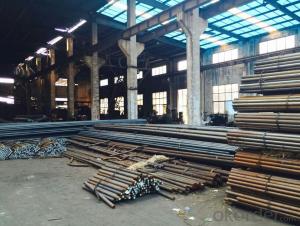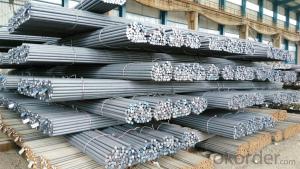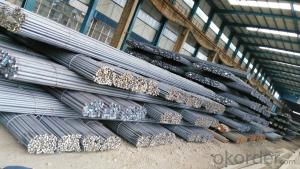45# Carbon Steel Hot Rolled Bars Forged Bars
- Loading Port:
- Tianjin
- Payment Terms:
- TT OR LC
- Min Order Qty:
- 25 m.t.
- Supply Capability:
- 50000 m.t./month
OKorder Service Pledge
OKorder Financial Service
You Might Also Like
Item specifice
45# Carbon Steel Hot Rolled Bars Forged Bars
Product Details:
Name:45# Carbon Steel Hot Rolled Bars Forged Bars
Place of Origin:Liaoning,China Brand Name:Dongbei Tegang
Shape:round bar Material: Alloy Structural Steel
Steel Grade: AISI 1045/JIS S45C/DIN C45/GB 45
Size:Diameter:16mm~350mm
Application:used in making high strengthened and wear resistant parts that works under high pressure, like axle, spring ring, axletree, cam, and steel sling etc.
Chemical Composition:
C | Si | Mn | Cr | Ni | Cu | P | S |
0.38-0.43 | 0.17-0.37 | 0.50-0.80 | ≤0.25 | ≤0.30 | ≤0.35 | ≤0.035 | ≤0.035 |
Characteristics:
- High hardness, strength and toughness.
- Poor plasticity during cold deformation.
- Medium machinability.
- Poor weldability.
- Poor hardenability.
- Cracks is often caused during water quenching process.
- Large parts should be in normalizing treatment.
Application:
45# Carbon Steel Hot Rolled Bars Forged Bars can be used to be manufactured roller, shaft, tyre, spring ring, damping spring, clutch and steel wire rope, etc.
Product Show:
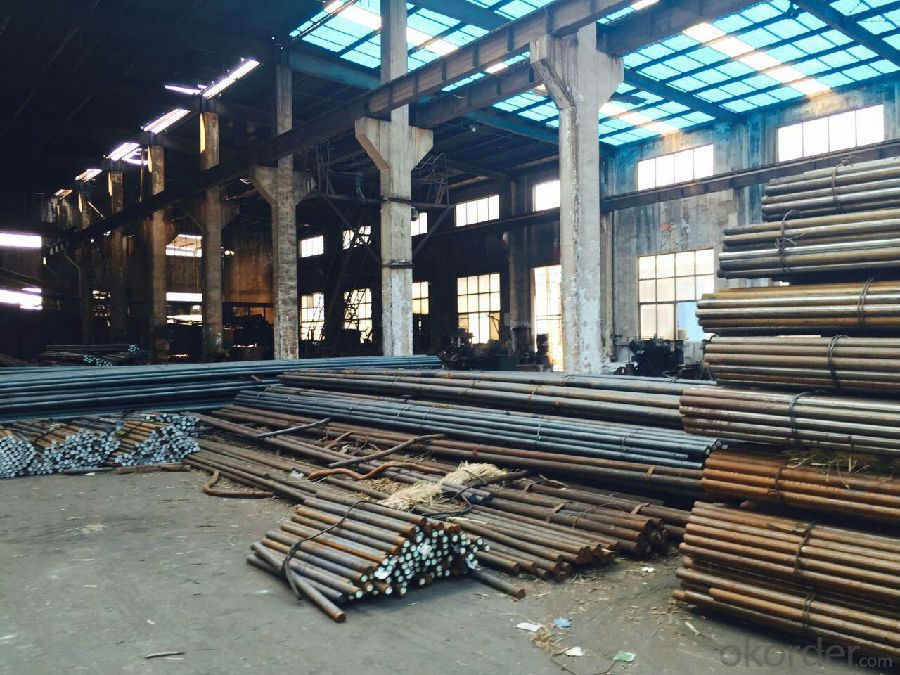
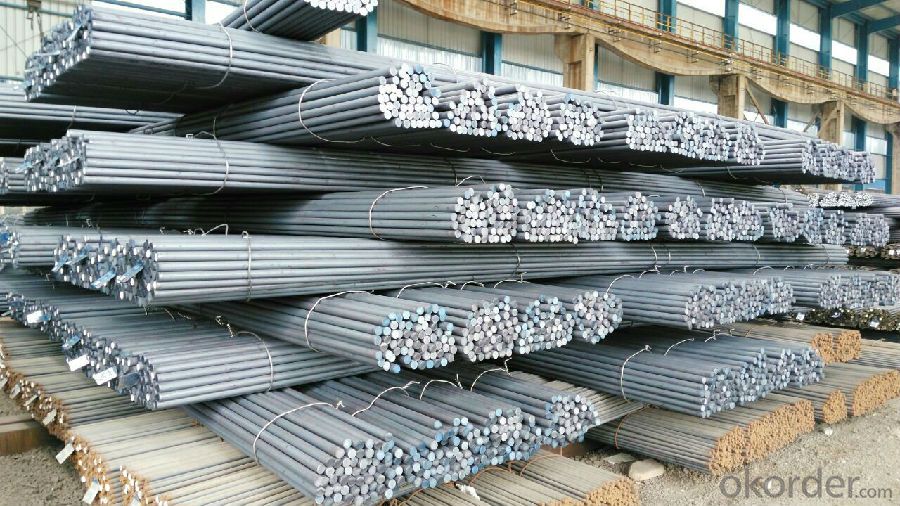
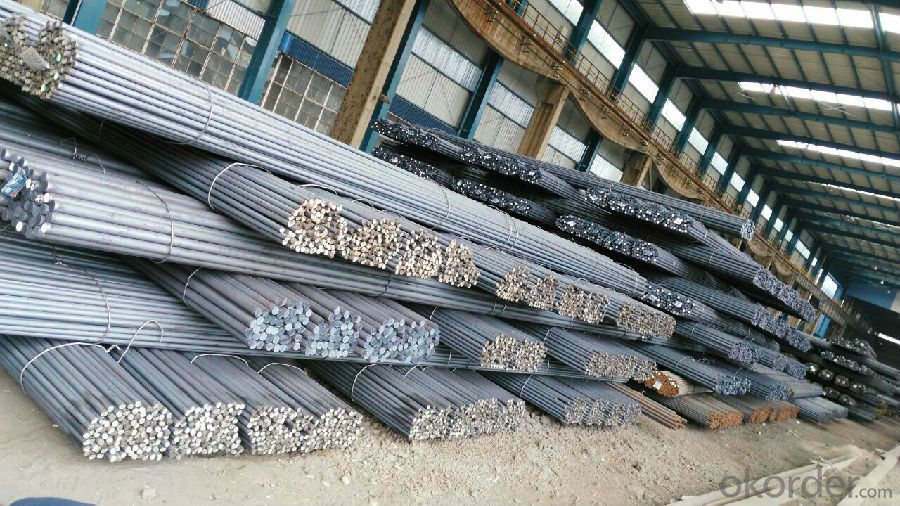
- Q:Can special steel be used for making electronics components?
- Yes, special steel can be used for making electronics components. Special steel refers to a type of steel that has been designed and manufactured to possess specific properties and characteristics that make it suitable for various applications, including electronics. In electronics manufacturing, special steel can be utilized for creating components such as connectors, springs, contacts, and other parts that require high strength, durability, and resistance to corrosion and wear. These properties are essential for ensuring the reliable performance and longevity of electronic devices. Additionally, special steel can also offer excellent thermal conductivity, electromagnetic shielding, and magnetic properties, which are crucial in certain electronic applications. For instance, in the production of transformers, special steel laminations are used to minimize energy loss and improve efficiency. Furthermore, special steel can be tailored to meet the specific requirements of different electronic components. For example, certain grades of stainless steel can be used for making components that need to withstand harsh environmental conditions or come into contact with corrosive substances. Overall, the use of special steel in electronics manufacturing provides an effective solution for producing components that can meet the demanding performance standards of modern electronic devices.
- Q:What are the different methods of surface powder coating for special steel?
- Special steel can be coated using various surface powder coating methods. These methods include: 1. Electrostatic powder coating: By charging the powder particles and spraying them onto the steel surface, a uniform and durable coating is achieved. The charged particles are attracted to the grounded steel. 2. Fluidized bed powder coating: Preheating the steel and dipping it into a fluidized bed of powder particles results in a smooth coating. The heat causes the powder to melt and adhere to the steel surface. Excess powder is removed through shaking or blowing air. 3. Flame spray powder coating: This method involves heating the powder particles with a flame and then spraying them onto the steel surface. The melted powder solidifies to form a coating. This method is commonly used for repairing damaged coatings or larger steel structures. 4. Thermal spray powder coating: By heating and propelling the powder particles onto the steel surface using a thermal spray gun, a dense and well-adhered coating is achieved. This method is suitable for high-wear applications and corrosive environments. 5. UV-cured powder coating: Applying a UV-sensitive powder onto the steel surface and exposing it to UV light initiates a chemical reaction that results in a hard coating. UV-cured powder coating is known for its fast curing time and excellent resistance to chemicals and UV radiation. Each method has its own advantages and considerations, and the choice depends on factors such as the specific requirements of the steel surface, desired coating thickness, and production volume.
- Q:What are the different types of mold steel?
- There are several different types of mold steel, including P20, H13, S7, and 420 stainless steel. Each type has its own unique properties and is used for specific applications in mold making and injection molding processes. P20 is a versatile mold steel that offers good machinability and wear resistance. H13 is a hot work tool steel known for its high heat resistance and toughness. S7 is a shock-resistant mold steel suitable for applications requiring high impact resistance. 420 stainless steel is corrosion resistant and commonly used for molds that require good polishing and texturing.
- Q:How does special steel contribute to the marine aftermarket industry?
- The marine aftermarket industry heavily relies on special steel, which offers a myriad of advantages and applications. To start, special steel possesses extraordinary strength and durability, making it an ideal choice for manufacturing marine parts and components. These include propeller shafts, rudders, marine engine parts, and various structural elements. The marine environment is notoriously harsh and corrosive, with constant exposure to saltwater, waves, and extreme weather conditions. Specifically designed to withstand these corrosive elements, special steel, such as stainless steel or corrosion-resistant alloys, provides exceptional resistance to rust, pitting, and other forms of corrosion. This ensures the longevity and dependability of marine equipment. In addition, special steel is frequently employed in high-performance marine engines and turbines due to its remarkable heat resistance and mechanical properties. It can endure high temperatures and pressures, making it suitable for marine propulsion systems that require superior performance and efficiency. Moreover, special steel finds extensive usage in the construction of marine vessels, including ships, offshore platforms, and submarines. Its high strength-to-weight ratio allows for the creation of lightweight yet robust structures, resulting in enhanced fuel efficiency and overall performance. Furthermore, special steel's ability to withstand impact and fatigue loading is crucial for maintaining the safety and structural integrity of marine vessels. Furthermore, special steel contributes to the marine aftermarket industry through its versatility. It can be easily fabricated and customized to meet specific design requirements, enabling the production of unique and tailored marine components. This flexibility empowers the marine aftermarket industry to offer a wide variety of replacement parts and upgrades for existing vessels, improving their performance, efficiency, and safety. In conclusion, special steel plays an indispensable role in the marine aftermarket industry. Its strength, durability, corrosion resistance, and versatility make it an essential material for manufacturing marine components, constructing vessels, and enhancing overall performance. With its unique properties, special steel ensures the safety, reliability, and efficiency of marine equipment, thereby contributing to the growth and success of the marine aftermarket industry.
- Q:How does stainless steel contribute to the construction industry?
- Stainless steel contributes to the construction industry by providing durability, corrosion resistance, and aesthetic appeal. It is widely used in structural applications, such as building facades, bridges, and roofing, as it can withstand harsh weather conditions and maintain its strength over time. Stainless steel's resistance to corrosion also makes it a suitable choice for plumbing, electrical, and HVAC systems, ensuring longevity and minimizing maintenance. Additionally, its sleek and modern appearance enhances the overall aesthetics of architectural designs.
- Q:How is nitriding steel used in surface hardening processes?
- Nitriding steel is used in surface hardening processes by introducing nitrogen into the steel's surface, resulting in the formation of a hard and wear-resistant outer layer. This process enhances the steel's mechanical properties, such as hardness, fatigue strength, and wear resistance, making it ideal for applications where high durability and resistance to abrasion are required.
- Q:How does special steel contribute to the automotive emission reduction?
- Special steel contributes to automotive emission reduction in several ways. Firstly, it is used in the manufacturing of lightweight components, such as the body and chassis, which helps to reduce the overall weight of the vehicle. This, in turn, improves fuel efficiency and reduces emissions. Additionally, special steel can be used to produce more durable and efficient engine parts, such as pistons and crankshafts, which enhance the overall performance of the engine and reduce emissions. Furthermore, special steel is also utilized in the production of exhaust systems, where its high temperature resistance and corrosion resistance properties help to improve the efficiency of catalytic converters, leading to lower emissions of harmful pollutants. Overall, the use of special steel in the automotive industry plays a crucial role in reducing emissions and promoting environmental sustainability.
- Q:How is high-speed tool steel used in the production of machining tools?
- High-speed tool steel is used in the production of machining tools due to its exceptional hardness and ability to retain its cutting edge even at high temperatures. This steel is used to create tool bits, inserts, and drill bits that are capable of withstanding the high speeds and forces involved in machining processes. Its high wear resistance and heat resistance properties make it an ideal choice for manufacturing cutting tools that can efficiently shape and form various materials during machining operations.
- Q:How does special steel contribute to reducing product weight?
- Special steel contributes to reducing product weight through its unique properties. Special steel is known for its high strength-to-weight ratio, which means it can provide the same level of strength and durability as other materials while being significantly lighter. By using special steel in the manufacturing process, products can be designed with thinner and lighter components without compromising their structural integrity. This reduction in weight not only makes the product more portable and easier to handle, but it also helps in reducing transportation costs and improving fuel efficiency in industries such as automotive and aerospace.
- Q:How does special steel contribute to improving product quality?
- Special steel contributes to improving product quality in several ways. Firstly, special steel is known for its superior strength, durability, and resistance to corrosion, making it ideal for manufacturing high-quality products that can withstand challenging conditions and last longer. Secondly, special steel often has unique properties like high heat resistance, excellent machinability, or specific magnetic properties, which enable manufacturers to create products with enhanced performance and functionality. Moreover, special steel allows for precise and intricate designs, enabling the production of complex components with tight tolerances, resulting in improved accuracy and efficiency. Overall, the use of special steel in manufacturing processes helps to ensure that the final products are of higher quality, more reliable, and better suited to meet the needs and expectations of customers.
1. Manufacturer Overview |
|
|---|---|
| Location | |
| Year Established | |
| Annual Output Value | |
| Main Markets | |
| Company Certifications | |
2. Manufacturer Certificates |
|
|---|---|
| a) Certification Name | |
| Range | |
| Reference | |
| Validity Period | |
3. Manufacturer Capability |
|
|---|---|
| a)Trade Capacity | |
| Nearest Port | |
| Export Percentage | |
| No.of Employees in Trade Department | |
| Language Spoken: | |
| b)Factory Information | |
| Factory Size: | |
| No. of Production Lines | |
| Contract Manufacturing | |
| Product Price Range | |
Send your message to us
45# Carbon Steel Hot Rolled Bars Forged Bars
- Loading Port:
- Tianjin
- Payment Terms:
- TT OR LC
- Min Order Qty:
- 25 m.t.
- Supply Capability:
- 50000 m.t./month
OKorder Service Pledge
OKorder Financial Service
Similar products
New products
Hot products
Related keywords
